Understanding the Knocking Sounds from Your Water Heater
Hot water heater knocking is a common household concern. If you've noticed banging, popping, or rumbling sounds coming from your water heater, you're right to pay attention—your unit is trying to tell you something.
Quick Answer: What Causes Hot Water Heater Knocking?
The most common causes of knocking sounds include:
- Sediment Buildup (99% of cases) - Minerals from hard water settle at the bottom of the tank, trapping steam bubbles that create popping and knocking sounds.
- Water Hammer - Sudden changes in water flow create shockwaves that cause banging in your pipes.
- Thermal Expansion - Metal components expand and contract during heating cycles, causing pinging or cracking sounds.
- Loose Internal Components - Parts like the anode rod or heating elements can rattle inside the tank.
- High Water Pressure - Excessive pressure creates turbulent flow and vibrations throughout the system.
The good news is that most knocking issues can be resolved with regular maintenance, like flushing your tank to remove sediment. However, persistent noises may indicate it's time to call a professional. This guide will help you identify the source of the knocking, understand the risks, and determine the right solution—whether it's a DIY fix or professional help.
For homeowners in the Bridgeville area dealing with persistent water heater issues, Sureway Comfort's expert plumbers can provide fast, reliable diagnosis and repair.

Top Causes of a Hot Water Heater Knocking
When your water heater starts making strange noises, understanding the cause is the first step toward a solution. Let's review the most common reasons for hot water heater knocking.
Sediment Buildup: The Most Common Culprit
If your water heater is making noise, there's a 99% chance sediment buildup is the problem. Your water contains dissolved minerals like calcium and magnesium, which settle at the bottom of the tank over time, forming a gritty layer.
When the burner or heating elements at the base of the tank turn on, they heat this sediment layer. Water trapped underneath boils, and the escaping steam creates the popping, rumbling, and knocking sounds you hear.
This sediment layer acts as a barrier, forcing your water heater to work harder and increasing your energy bills. Worse, the mineral deposits can damage the tank's protective lining, leading to corrosion, leaks, and even tank failure.

Water Hammer: A Plumbing Shockwave
Sometimes the banging isn't from your water heater but from the pipes. Water hammer occurs when fast-flowing water is forced to stop suddenly, like when a faucet is shut off quickly or an appliance like a dishwasher stops filling. The abrupt stop creates a shockwave that travels through the pipes, causing them to vibrate and bang against walls or floors.
The telltale sign is timing: if the knocking sound happens right as you shut off a hot water tap or an appliance finishes a cycle, water hammer is the likely cause. While often just an annoyance, persistent water hammer can stress your plumbing and lead to loose joints or leaks.
Other Common Causes of Knocking
Beyond sediment and water hammer, other issues can cause noise:
- Thermal Expansion: Metal components in the tank and pipes expand and contract with temperature changes, creating pinging or cracking sounds. Loud noises could signal high pressure.
- Loose Components: Internal parts like the anode rod or dip tube can break loose and rattle. In electric heaters, heating elements can vibrate and knock if they aren't secure or have scale buildup.
- Faulty Heat Traps: Malfunctioning heat traps or check valves, designed to prevent heat loss, can vibrate and knock if clogged or broken.
- High Water Pressure: Pressure above 60 PSI creates turbulent flow, leading to vibrations and knocking. It can also worsen water hammer.
Both gas and electric water heaters are prone to sediment buildup. However, electric heaters have an extra issue: scale can form directly on the heating elements, causing them to pop and crack as they expand and contract. For a detailed look at where all these components fit together, check out this Anatomy of a gas water heater.
If you're dealing with persistent knocking, the experienced technicians at Sureway Comfort can diagnose the problem and recommend the right solution for your home in the Bridgeville area.
Is a Knocking Water Heater Dangerous?
When you hear hot water heater knocking, your first thought might be, "Is this thing about to explode?" While a catastrophic failure is rare, the noise is a warning sign you shouldn't ignore.
The real danger is the long-term damage caused by ignoring the problem. Sediment buildup forces your water heater to work harder, increasing energy bills. Over time, this sediment grinds against the tank's inner lining, causing corrosion and creating weak spots.
These weak spots can lead to leaks, which can cause significant water damage. In a worst-case scenario, the tank's integrity could fail completely, flooding your home. The bottom line: a knocking water heater isn't an immediate emergency, but ignoring it is dangerous.
Signs Your Water Heater Needs More Than a Simple Fix
Sometimes a knocking sound just means your water heater needs a good cleaning, but other times it's a sign of a bigger problem. It's time to call a professional if you notice any of these red flags:
- Leaks or puddles: Any water around the unit indicates a failure, such as a cracked tank or faulty valve.
- Rusty or discolored hot water: Brown or reddish water signals advanced corrosion inside your tank or pipes.
- Inconsistent or no hot water: Combined with knocking, this points to a significant failure, like a broken heating element or severe sediment blockage.
- Visible corrosion on the tank: Rust on the exterior, especially around seams, means the tank's structural integrity is compromised.
- Loud, persistent banging: If the noise is violent, continuous, or doesn't stop after a heating cycle, it could be a sign of extreme sediment buildup or structural issues.
If you're experiencing any of these symptoms along with your hot water heater knocking, it's time to put down the DIY tools and pick up the phone. The experienced technicians at Sureway Comfort have seen it all and can diagnose exactly what's happening with your water heater. Contact us today to schedule an inspection and get your hot water system back to working quietly and efficiently.
DIY Fixes vs. Calling a Professional Plumber
When you hear hot water heater knocking, you may be able to fix it yourself. However, it's crucial to know when to tackle the job and when to call a professional, especially when dealing with a tank of hot, pressurized water.
DIY Solutions for a Hot Water Heater Knocking
For many hot water heater knocking issues, a DIY approach can work. The most effective solution is flushing the tank to remove sediment buildup, which restores efficiency and silences the noise. Other simple fixes include securing loose pipes to address water hammer or running all hot water faucets for a few minutes to release trapped air in the plumbing.
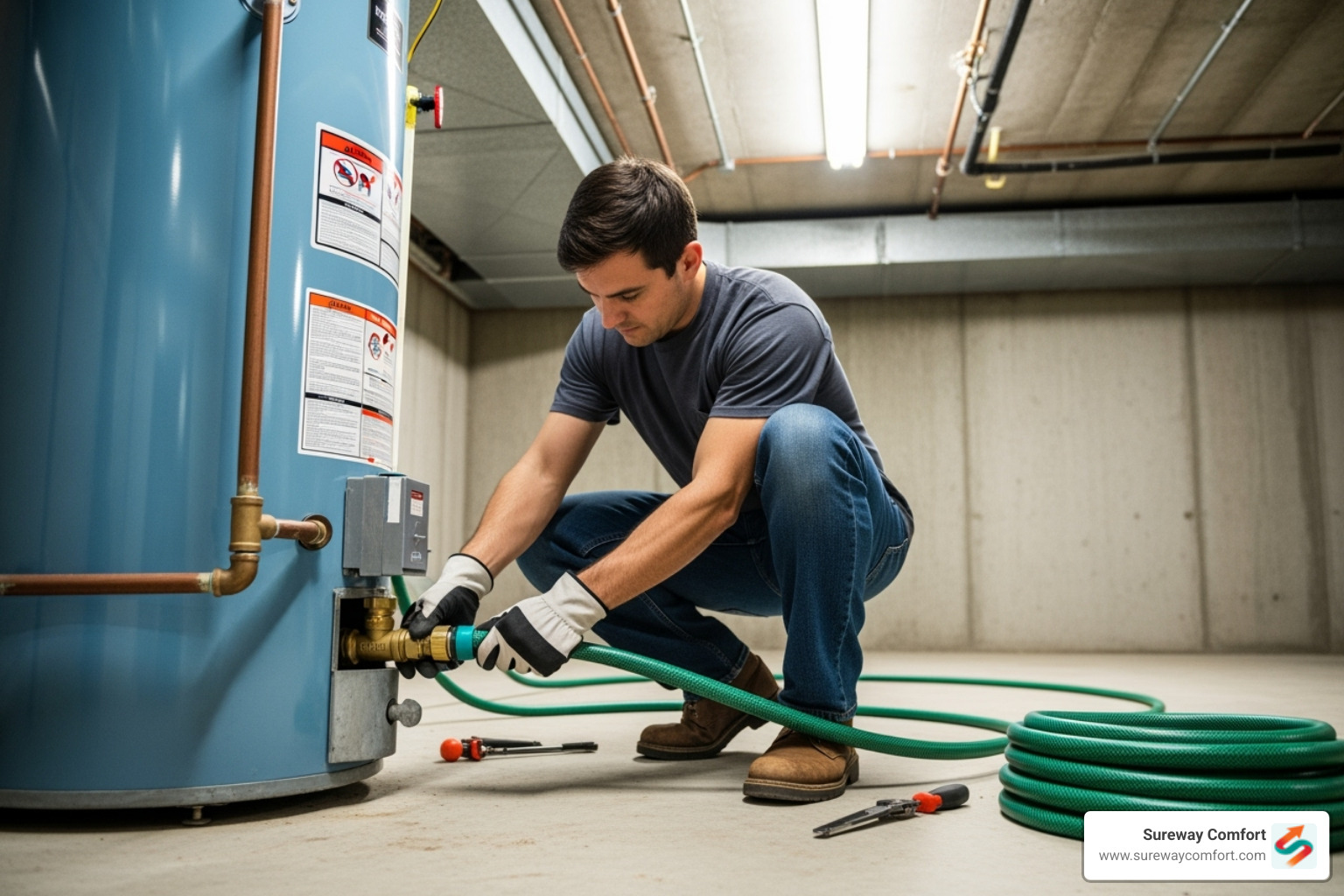
How to Flush Your Water Heater: A Step-by-Step Guide
If sediment is the cause of your hot water heater knocking, flushing the tank is the solution. Safety first: wear protective gloves, as the water will be hot.
Here's a step-by-step guide:
- Turn off power and water. For an electric heater, flip the circuit breaker. For a gas model, turn the gas valve to "Off" or "Pilot." Then, shut off the cold water supply valve to the tank.
- Connect a garden hose. Attach it to the drain valve at the bottom of the tank and run the other end to a floor drain or outside.
- Relieve tank pressure. Open a hot water faucet somewhere in your house.
- Drain the tank. Open the drain valve and let the tank empty completely. The water will likely be discolored with sediment.
- Flush out remaining sediment. With the drain valve still open, turn the cold water supply on for 10-15 seconds to stir up sediment, then turn it off. Repeat until the water draining from the hose runs clear.
- Refill the tank. Close the drain valve, disconnect the hose, and leave the hot water faucet open. Slowly open the cold water supply valve to refill the tank. Close the faucet once water flows from it steadily.
- Restart the heater. Once the tank is full, turn the power or gas supply back on.
When to Call a Professional for Your Hot Water Heater Knocking
While flushing the tank is a great DIY fix, some situations require a professional. Call a plumber for your hot water heater knocking if:
- Flushing doesn't work: If the noise continues after you've flushed the tank, the sediment may be too hardened to remove, or another issue is at play.
- You see serious warning signs: Leaks, rust, or corrosion are signs of potential tank failure and require immediate professional assessment.
- You suspect water hammer or high pressure: A plumber has the tools to diagnose and properly install solutions like water hammer arrestors or a pressure-reducing valve.
- Your water heater is old: For units over 10 years old, knocking may signal the end of its lifespan, and replacement might be more cost-effective than repair.
- You have a gas heater and smell gas: Never attempt to fix gas line issues yourself. Call a professional immediately.
- You're not comfortable with the job: If you're unsure about any step, it's always safer to call for expert help.
For homeowners in Bridgeville and surrounding areas, our experienced technicians at Sureway Comfort are ready to help with any hot water heater knocking issue that's beyond the DIY scope. Contact us for professional water heater services and restore peace and quiet to your home.
Preventative Maintenance to Keep Your Water Heater Quiet
Proactive maintenance extends your water heater's lifespan, improves efficiency, and prevents irritating hot water heater knocking sounds. A little care now can save you from expensive emergency repairs later.
Annual Flushing and Anode Rod Inspection
The most important maintenance task for preventing hot water heater knocking is annual tank flushing. This removes sediment before it can build up and cause problems. If your home has very hard water, as many in the Bridgeville, PA area do, consider flushing every six months.
Another key component is the sacrificial anode rod, which corrodes to protect your tank's steel lining. Over time, it gets depleted and must be replaced. We recommend a professional inspection every few years. Replacing a worn-out anode rod is an inexpensive way to add years to your water heater's life and prevent corrosion that leads to knocking and leaks.

Check Water Pressure and Temperature
Regularly checking your water pressure and temperature settings also helps prevent hot water heater knocking.
- Water Pressure: Your home's pressure should be between 40-60 PSI. Pressure above 80 PSI can cause vibrations, trigger water hammer, and strain your system. A pressure-reducing valve can solve high-pressure issues.
- Temperature: We recommend setting your water heater to 120°F. This is safer (reducing scald risk), more energy-efficient, and slows the formation of mineral sediment, which is the primary cause of knocking.
By making these simple maintenance practices part of your home care routine, you're maximizing your water heater's efficiency and avoiding costly repairs. If you need help with professional maintenance in the Bridgeville area, Sureway Comfort's experienced technicians are ready to ensure your system stays in top shape.
Frequently Asked Questions about Water Heater Noises
We talk to homeowners in Mt Lebanon, Bethel Park, and Canonsburg every day about their hot water heater knocking concerns. Here are answers to the most common questions.
How often should I flush my water heater?
We recommend flushing at least once per year. If you live in an area with very hard water, like many parts of Pennsylvania, you should do it every 6 months. Regular flushing prevents sediment buildup, keeps your heater efficient, and extends its life.
Can a water heater be too old to fix the knocking?
Yes. For units over 10-12 years old, knocking can be a sign that replacement is the best option. After a decade, sediment can become so hardened that a normal flush won't remove it. More importantly, the tank's internal lining may be corroded, compromising its integrity. Attempting a repair on a very old, fragile tank can sometimes do more harm than good. Our technicians can provide an honest assessment of whether a repair or replacement is the smarter choice. Contact our team for an honest assessment of your water heater's condition.
Is knocking more common in gas or electric water heaters?
Both types are equally susceptible to hot water heater knocking from sediment buildup. However, electric water heaters have an additional source of noise. Scale can build up directly on the heating elements, causing them to make a distinct knocking or popping sound as they expand and contract during heating cycles. Gas heaters don't have this specific issue, though they can make other noises like hissing.
Conclusion: Restore Peace and Quiet to Your Home
A hot water heater knocking is your unit's way of signaling a problem. In most cases, the culprit is sediment buildup, where minerals from hard water create a layer at the bottom of your tank that traps steam and causes noise.
The good news is that a thorough tank flush often solves the problem. However, ignoring the knocking can lead to reduced efficiency, higher energy bills, and eventual tank corrosion, which could result in leaks and costly water damage.
Preventative maintenance is your best defense. An annual tank flush, along with checking your water pressure and anode rod, can add years to your water heater's life and keep it running quietly.
If you've tried a DIY fix and the noise continues, or if you see serious warning signs like leaks or rusty water, it's time to call a professional. Some problems require an expert diagnosis to resolve safely.
For homeowners in the Bridgeville area—including McDonald, Mt Lebanon, Bethel Park, Canonsburg, and surrounding communities—Sureway Comfort's experienced technicians are ready to help. We'll diagnose the issue and get your system running quietly and efficiently again.
Don't let a minor knock become a major plumbing emergency. Contact us for professional water heater services today and restore peace, quiet, and comfort to your home.



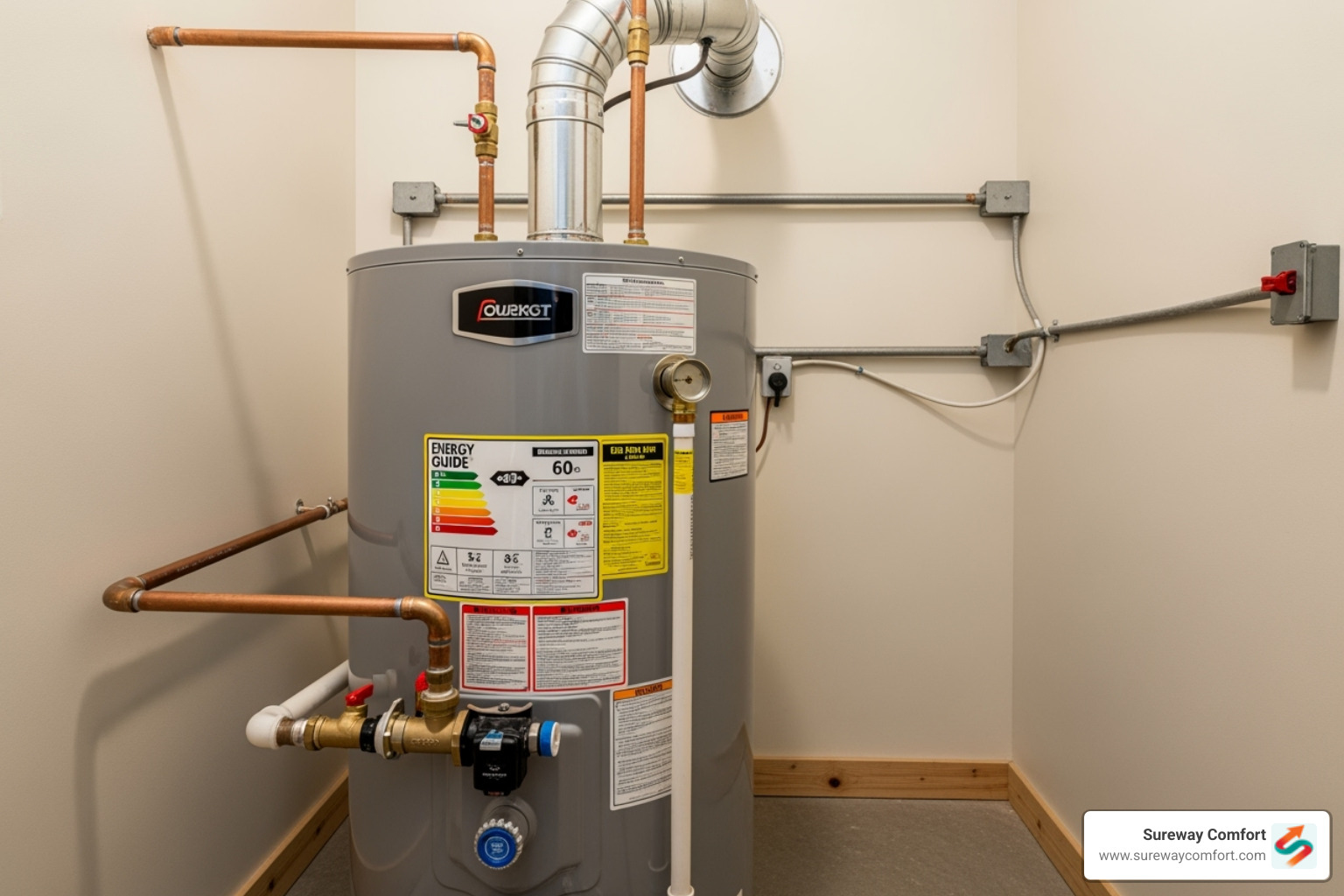
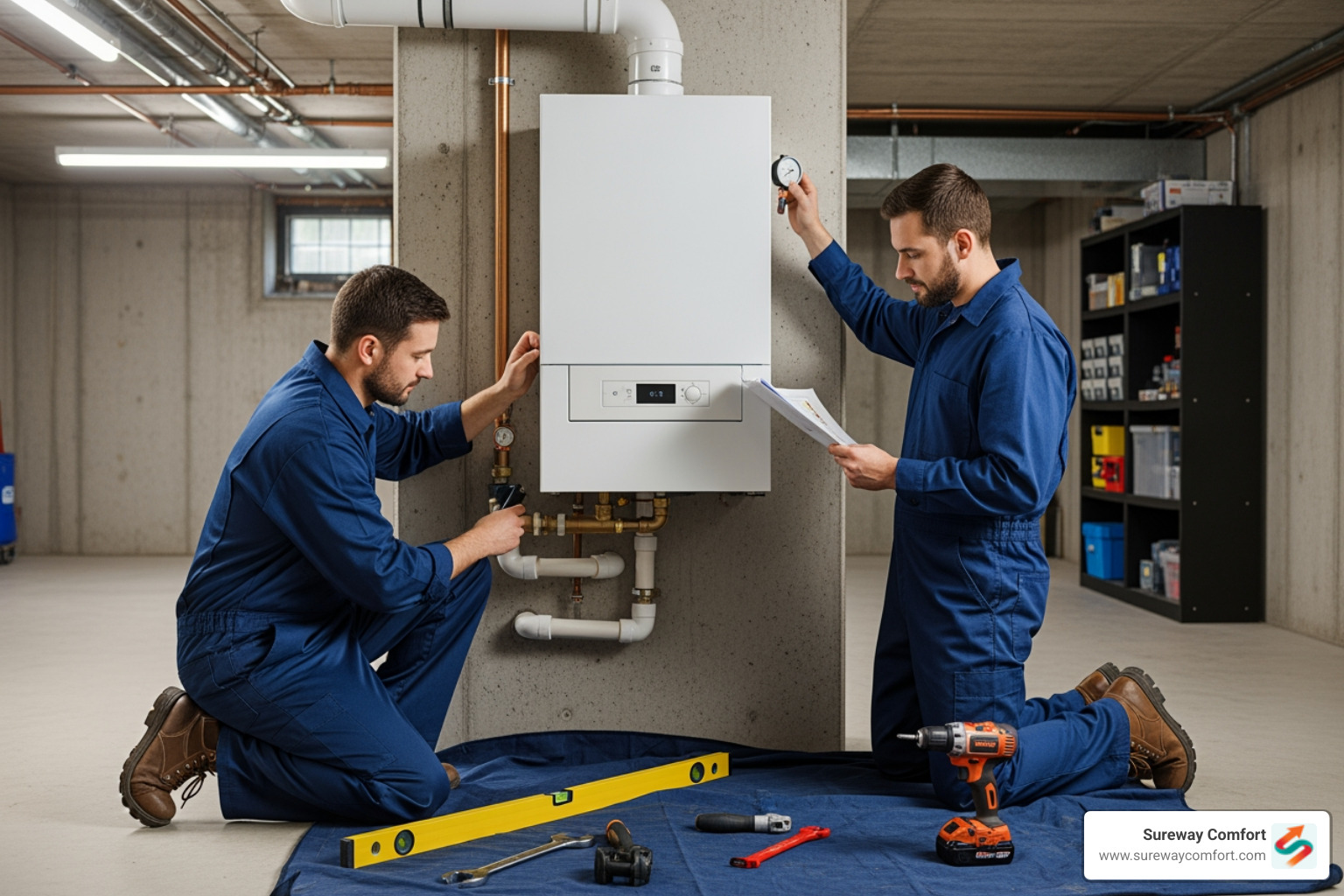

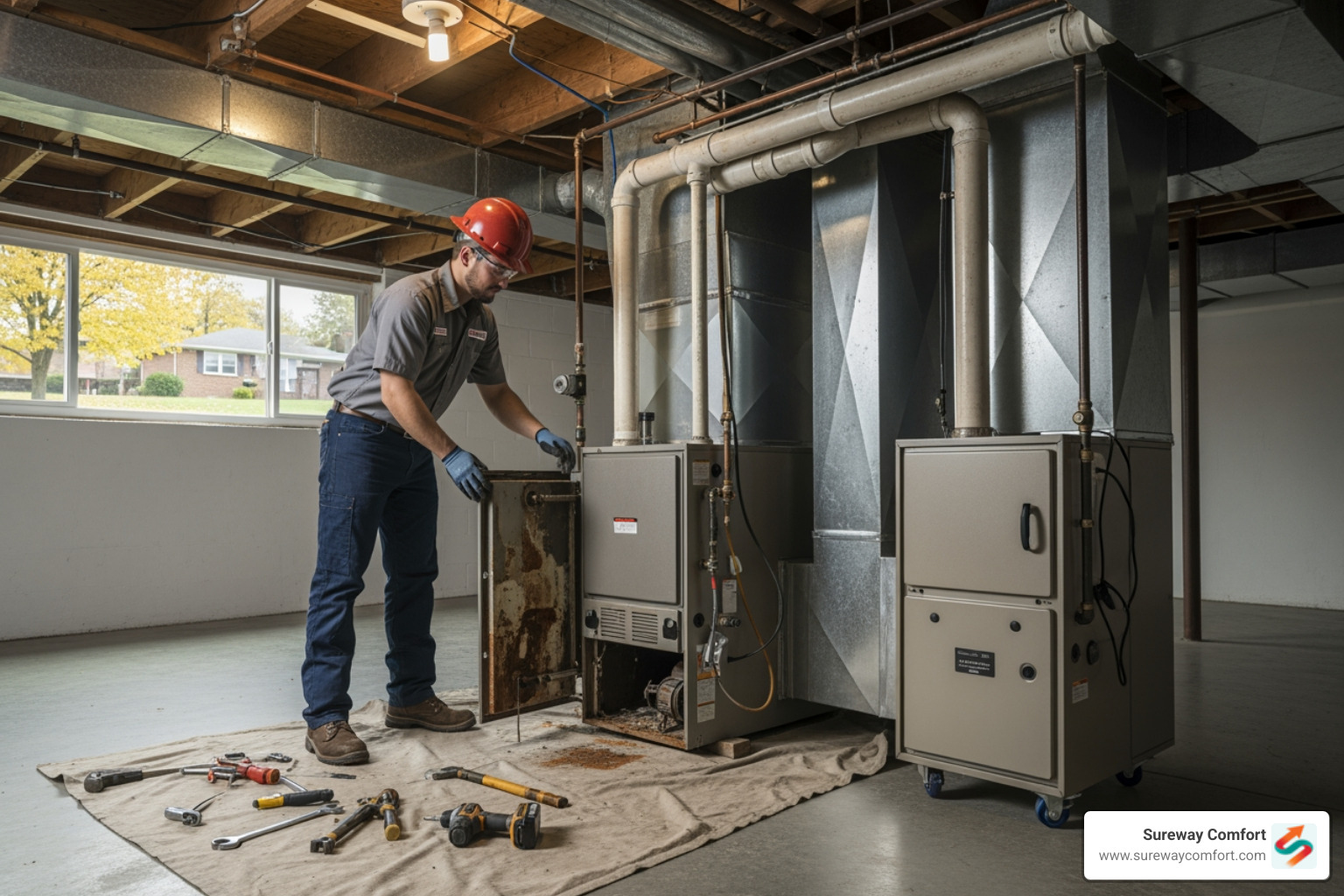
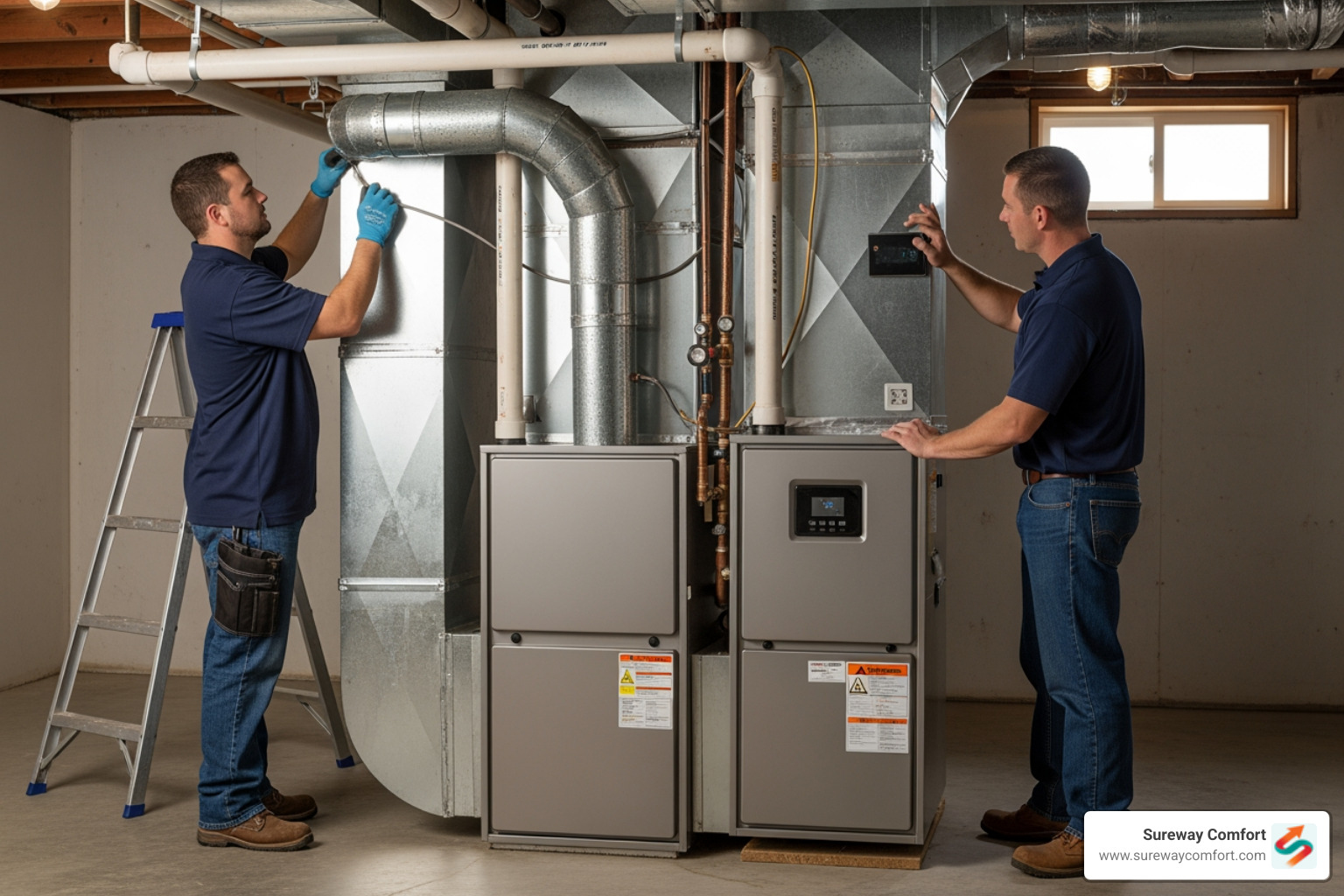




















.avif)



